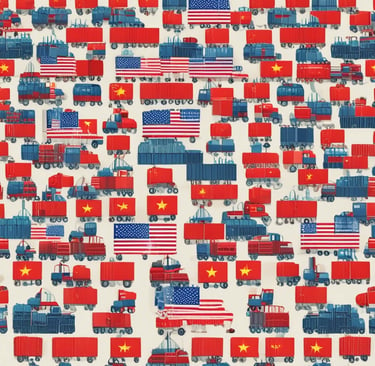Vietnam Signals Strong Confidence in Trade Talks with the U.S.: What's Behind It?
6/26/20252 min read


Recently, high-level Vietnamese officials expressed strong confidence regarding trade negotiations with the United States. This optimistic stance not only demonstrates Vietnam’s proactive approach but also reveals its strategic considerations and underlying strengths in the current international trade landscape.
1. Growing Bilateral Trade Cooperation
The United States remains one of Vietnam’s most crucial export markets, with bilateral trade volume steadily increasing in recent years. In 2023, the U.S.-Vietnam trade volume reached new highs, underscoring the solid foundation of economic ties between the two countries. This strong economic relationship provides substantial support for more comprehensive trade negotiations.
2. Opportunities from Global Supply Chain Restructuring
The global realignment of supply chains has prompted many American companies to reposition their presence in Asian markets to reduce reliance on any single country. Vietnam has actively embraced this trend by continuously improving its investment climate, attracting multinational enterprises, and strengthening its position as a key node in global supply chains.
3. Continued Optimization of the Policy Environment
In recent years, the Vietnamese government has introduced a series of favorable policies, including establishing free trade zones, offering tax incentives, and upgrading infrastructure to attract foreign investment and drive industrial upgrading. These measures equip Vietnam with additional leverage and attractiveness in negotiations.
4. Strategic Role within the ASEAN Economic Community
As a significant member of ASEAN, Vietnam plays a pivotal role in regional economic integration. Successful trade negotiations with the United States are not only important for Vietnam but will also advance ASEAN’s overall economic ties with the U.S. Vietnam is leveraging this regional advantage to gain greater initiative in negotiations.
5. Future Challenges and Recommendations
Despite its optimism, Vietnam still faces significant challenges in trade talks, including labor standards, intellectual property protection, and environmental regulations. Vietnam must proactively address U.S. concerns, portraying itself as a responsible and reliable trading partner to achieve genuine mutual benefits.
Conclusion
Vietnam's strong confidence in trade negotiations with the United States stems not only from its economic strength and policy readiness but also from strategic vision and awareness of international dynamics. If Vietnam effectively manages the challenges in the negotiations, U.S.-Vietnam economic relations will undoubtedly enter a deeper and more stable phase.
